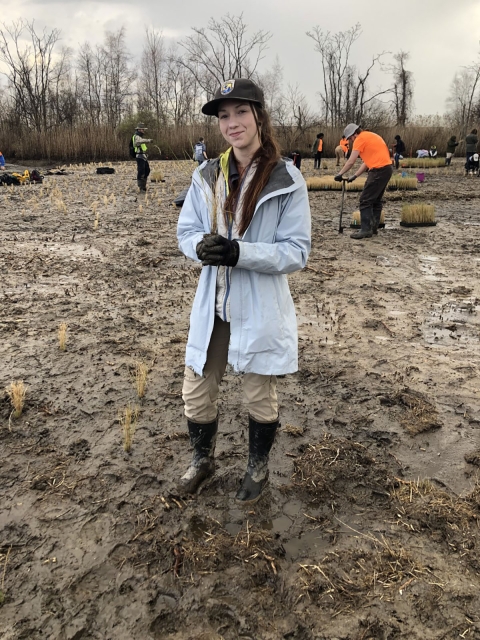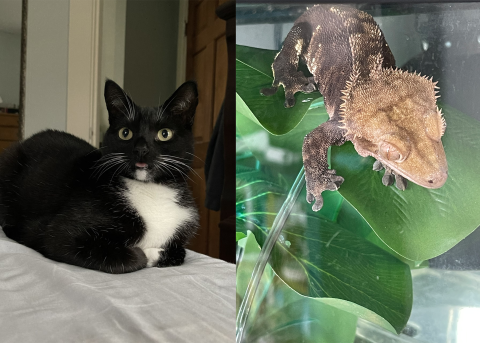As happy as Sarah Shearer was as a seasonal biological technician for the New England Field Office and the Southern New England Estuary Project, we were even happier to have her. With a master’s degree in conservation biology from Antioch University New England and a bachelor’s degree in environmental science from Westfield State University, Shearer’s breadth of knowledge has been an asset. However, it is her passion for making and understanding connections that made her invaluable.
This past summer she had the opportunity to work on the Great Meadows Marsh restoration project in Stratford, Connecticut. The $4.6-million restoration was the result of the collaboration between many different partner organizations. Despite the large scale of the project, Shearer developed a thorough understanding of the project by taking part in each step.
Her experience on the ground informed the narrative she drafted for a StoryMap about the restoration project. The map will cover the history of the site and the variety of positive impacts that the restoration has brought. Shearer and her colleagues will use this map to highlight the ecological, environmental justice, public health, and community benefits of the project, emphasizing the interconnection between people and their environment.
This interconnectivity is the heart of Shearer’s environmental enthusiasm. She has a specific interest in community ecology, the area of biology that studies how species interact and evolve with the other species and abiotic or non-living features (water, sunlight, temperature etc.) of their ecosystem. Instead of focusing on a single organism or single issue, Shearer is fascinated with the relationships of each aspect to the ecology of the whole.
“I really like working jobs like this where you can regularly observe the links between variables that make a natural community or habitat unique and how those habitat conditions have affected the evolution of species that utilize it,” said Shearer. “I feel like I have gained experience working in a number of habitats in recent years, and I really value the perspective that provides me with.”
Even when she was young, Shearer had an interest in all species big and small. Her family yard in Northfield, Massachusetts, was overflowing with natural habitat. Her family always had various flowers and vegetables growing in their garden.
Said Shearer, “One of my earliest memories is of my dad encouraging me to go out into the garden and collect bugs. I was always fascinated by nature, especially the little things.”
That fascination carried on into adulthood. Today, Shearer is an advocate for underappreciated or “less charismatic” species, such as pine barren moths, American burying beetles, snails, and mollusks. In her free time, she enjoys identifying the plants and animals she comes across while walking, hiking, or gardening, in the surrounding ecosystem of Greenfield, Massachusetts, where she now lives.
“I occasionally set light traps for moths and go searching for other organisms like caterpillars and other invertebrates and plants that I can identify and submit to iNaturalist,” explained Shearer. “I also started my own pollinator garden this year and have adopted far too many tropical house plants during the last year of the pandemic.”
That’s not the only thing she’s adopted. With ten crested geckos, a turtle, and a cat, Shearer has developed quite the ecosystem (or ecosystems) in her own home.
As her term comes to a close, Shearer strides from the Service with an even deeper understanding of the interconnectivity of humanity and the wild. This experience has only encouraged her to continue a life-long career in conservation.
“I feel like it is a bit early in my career to be thinking of my legacy,” said Shearer. “Maybe I kind of hope that my presence will help open some people up to the idea that modern conservation professionals can come from all walks of life, with their own unique stories and previous hardships, and yet they can be just as passionate about conservation, just as curious about the world, and just as invested in making a difference.”
Although term employees are only with us for a short time, they make a huge impact on the Service and conservation as a whole. We could not accomplish our mission without them. Shearer is just one of many incredible colleagues that have left the Service better than they found it.
For more information about how you can begin a career with the U.S. Fish and Wildlife Service, visit our careers and internships visit our career and internships page.








